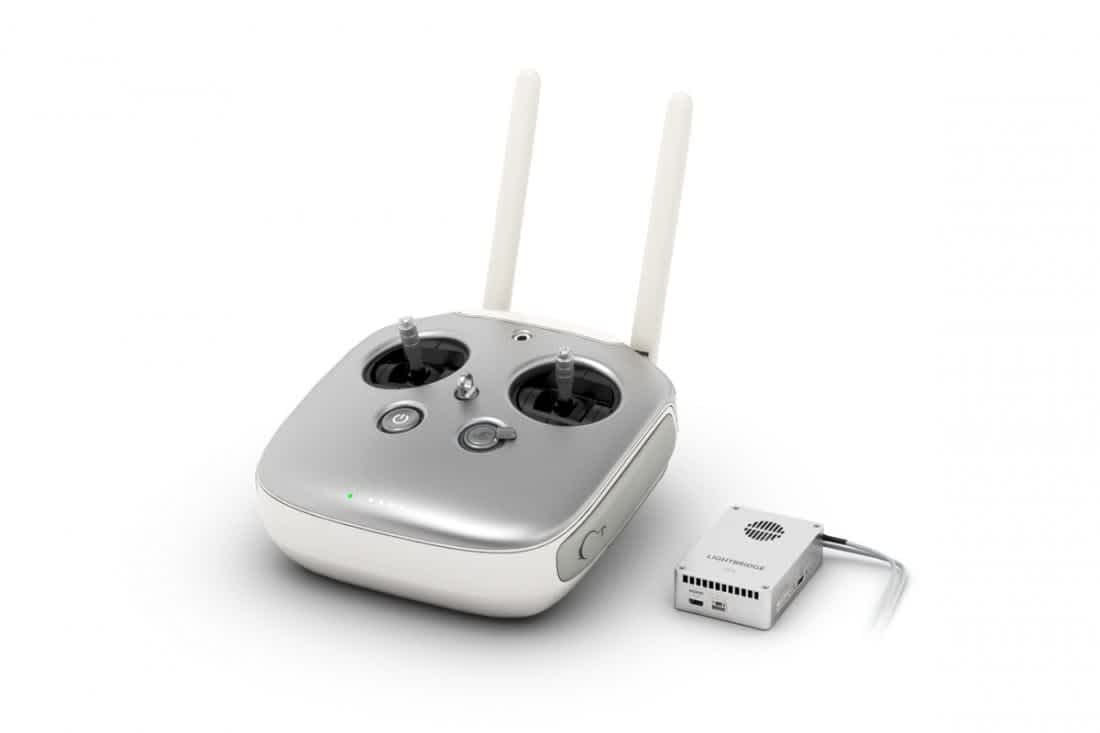
Updated on 9 Sep 2024
Lightbridge 2 vs Amimon CONNEX
DJI Lightbridge 2 is a new, faster and longer range control and video transmission system for professional drones. How does it compare? ... Read More
It barely seems like five minutes since DJI launched its revolutionary Lightbridge system, combining a digital HD video transmission system with flight control. (It was actually the end of April 2014). Now there's Lightbridge 2 which was launched this month and slightly overshadowed by the announcement about the exciting new X5 cameras for the Inspire 1. So how does the latest model compare with version 1 and the rival system - the Amimon CONNEX? The biggest and most obvious difference with Lightbridge 2 is that the ground end of the system has been combined into a remote controller. That means you don't have to connect a separate Lightbridge unit to your remote so the setup time is shorter. You will, of course, have to connect a tablet or smartphone. You will also need to have a separate remote controller for each video monitor as well as one for the camera/gimbal operator. On the original Lightbridge not only did you have to connect a cable from the remote to the ground station, you also had to use another cable link the pilot's controller with the camera operator's controller. large_p1-e1442574913270.jpg The new DJI Lightbridge 2 large_dji-lightbridgelarge_large-1-e1442575010132.jpg The original DJI Lightbridge Rather like the remote for the Inspire 1 and Phantom 3, it includes hardware controls for photo and video capture and gimbal pitch. It also connects to your phone or tablet do that you can use the DJI GO app for many important functions and not just for monitoring Full HD 1080p pictures. For two man operation you'd need a second controller. Lightbridge 2 can transmit video from two cameras simultaneously. There's even a picture-in-picture mode that allows you to view the pilot's FPV camera output at the same time as the main camera. Output a Picture-In-Picture view to a TV or other external display, where the FPV is layered with the main camera view. The views and controls are completely independent so that the gimbal control won't affect the pilot view or the aircraft’s navigation, and vice versa. Lightbridge 2 is primarily designed for use on bigger, professional rigs like the DJI S900, S1000 and S1000+ using Zenmuse Z15 camera gimbals. It's only compatible with the A2 and Wookong-M flight controllers, which means it could also be retrofitted to the S800 EVO and even the F550 and F450, as long as they're not using Naza-M. The operating range has been increased from 1.7km to 2km (1.2 miles) although in the UK you're limited to 500 metres without CAA approval for EVLOS (Extended Visual Line of Sight).
Live HD broadcast pictures
The big improvement is that HD pictures can be broadcast live by using a 3G-SDI output on the ground unit. SDI is a Serial Digital Interface widely used in the broadcast industry and uses coax cable and BNC connectors. 3G means it can handle 2.970 Gbps or nearly 3. For broadcast it will deliver in PAL 1080i/50fps or NTSC 720p/59.94fps. There's also a mini-HDMI which will handle HD feeds. Using the DJI GO app, you can choose to encrypt the video feeds. At full stretch the Lightbridge 2 master unit can feed 3 slaves wirelessly at a range of up to 50 metres. It means there can be a pilot, camera/gimbal operator, director and audience all getting a feed. The video latency on Lightbridge 2 is an improvement on the original. It's as fast as 50ms compared to 100ms on its predecessor. The system adapts the signal to keep latency low. It actively looks for and selects the best available channel. With the DJI GO app you can choose between maximum video quality or lowest latency and it will even let you manually select a channel. large_p6-e1442583560988.jpg Outputs on the Lightbridge 2 controller. USB, mini-HDMI, 3G-SDI, and micro-USBAmimon Connex - zero latency
Amimon CONNEX latency leader
The Amimon CONNEX still has the edge when it comes to latency. It feeds full 1080P 60fps HD video from air to ground with only 1ms delay, which is officially classified as zero. That means you get instant, top quality pictures without any buffering. The CONNEX can be fitted to DJI heavy-lift multirotors but it is equally at home on a Freefly ALTA hexacopter or a Freefly MoVi stabiliser. It can also be fitted to the DJI Ronin and Ronin-M handheld stabiliser. The advertised range on the Connex is shorter than the Lightbridge. For highest quality it's up to 1000 metres but that's still very impressive and, for practical purposes, it's more than enough for professional operators. Presumably it's capable of going further but with reduced quality. The transmission system operates in the 5.8GHz band so it won’t interfere with your aircraft’s control channels in the 2.4GHz range. Automatic Frequency Selection will choose the best channel available at any one time and will switch to another, stronger one if necessary. Lightbridge 1 and 2 use the 2.4GHz for both video and control. For many keeping the frequencies separate is worth it for peace of mind. There's also video encryption using AES128 (Advanced Encryption Standard) and RSA1024 for key exchange to ensure that your content is protected when it's being fed from the air to the ground. amimon-connex.png The Amimon Connex CONNEX's On-Screen-Display (OSD) shows both information about your wireless link status, and MAVLINK based telemetry from your drone flight controller. The Amimon CONNEX comes with a range of accessories. You can use up to a total of four receivers linked to screens depending on the requirements of your shoot.
Prices
The Lightbridge 2 sells for £1059 while the original Lightbridge has been reduced from £999 to £709. The Amimon CONNEX is priced at £1299 and, like the original Lightbridge, it doesn't come with a remote control or a monitor. For Lightbridge 2 you'll also have to factor in the additional cost of a tablet or smartphone to run the DJI GO app but it will also do the job of a monitor as well.

written by
James Willoughby
James joined heliguy™ in 2018 following a 13-year stint in print and online journalism, having worked on regional and weekly newspaper titles. He is responsible for spearheading heliguy™'s content strategy and social media delivery. James collaborates with DJI Enterprise's European marketing team to coordinate and produce case studies and helps organise events and webinars.